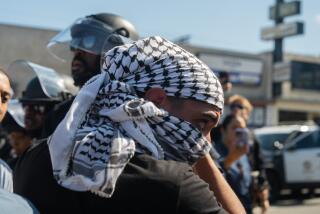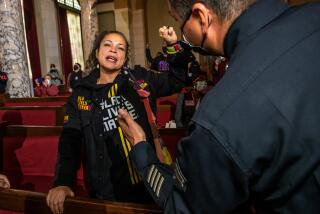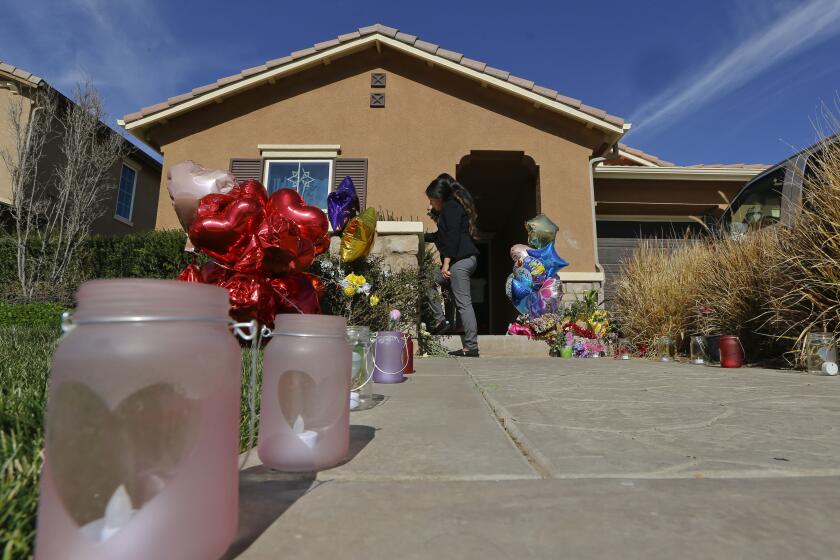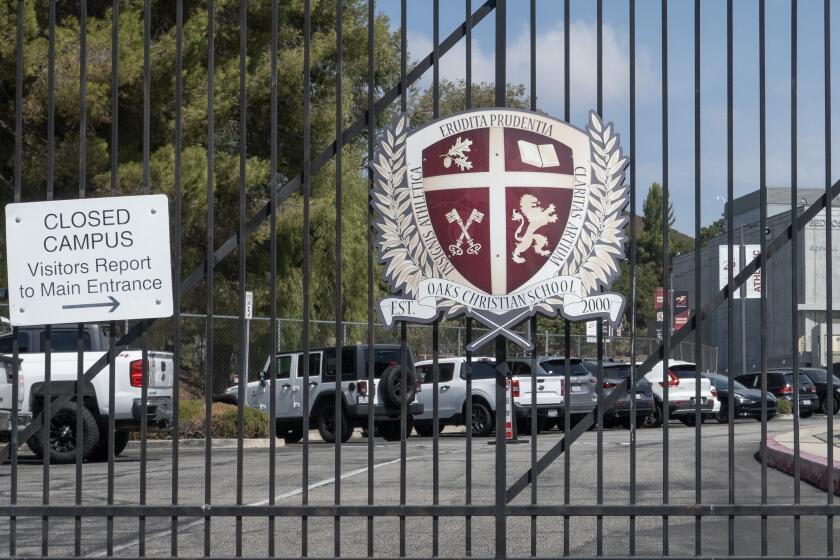Efforts for Calm Continue as King Jury Meets
In a carefully guarded room at the Edward R. Roybal Federal Building, jurors in the Rodney G. King civil rights trial on Tuesday spent their fourth day mulling the case, shielded from the tightening security measures going into place around the city.
The jury concluded for the day at 4:15 p.m., having deliberated for another 6 hours and 45 minutes without reaching verdicts.
Meanwhile, various efforts by community leaders and activists to keep the peace took place throughout the city amid an atmosphere rife with rumors.
Rep. Maxine Waters (D-Los Angeles) issued a call for calm in a personal letter distributed by former gang members and community leaders to 350,000 residents in South Los Angeles. “We have to build, not burn. We’ve got to live, not die,” she said in the letter.
The Rev. Benjamin F. Chavis, days after his selection as the new executive director of the NAACP, flew to Los Angeles Monday night and took up residence in the Imperial Courts housing project, where he also called for peace and asked the country to turn its attention to the needs of the inner-city poor.
Outside the federal building, representatives of the U.S. Marshals Service erected concrete barriers and fenced off a nearby parking lot to use as a staging area for police. Elsewhere, Los Angeles police officers remained at a heightened stage of readiness, with extra patrols poised to react, if necessary, when the verdicts are announced.
U.S. District Judge John G. Davies, concerned about a broadcast of a sketch that he believed could allow viewers to identify the anonymous jurors, ordered artists to take more care.
“The court has observed with concern that certain sketches of the jurors aired on television news broadcasts may be sufficiently detailed to permit juror identification and are entirely too accurate for comfort,” Davies said. “Any drawings of jurors or alternate jurors must contain minimal detail and must not render the jurors recognizable.”
Courtroom artists responded by producing a stick-figure drawing of the jurors and posting it on a pressroom wall. The sketch was stamped: “Approved.”
The jury deliberated in silence Tuesday, sending no new clues as to how it may be leaning. So far, the only communication came in the form of two requests, both denied by Davies.
The first asked for a transcript of testimony by California Highway Patrol Officer Melanie Singer, who told jurors that she had seen Officer Laurence M. Powell strike King in the face and head six times with his baton. Singer cried on the stand as she recounted the story.
The second request came late Monday. Jurors asked whether they could take their notes home with them at night. Davies also denied that request.
Waters released the text of her letter at a news conference and afterward made several trips through her district to deliver copies to residents.
“If you take to the streets . . . you give the police the legal right to kill you,” she read from the text of the newspaper-sized letter. “Our anger and frustration must not drive us to the streets. We must use our minds and our God-given talents and our legacy of perseverance and struggle. We must fight our battles in the courtroom and in the halls of power.”
At the Imperial Courts housing project, she was greeted with hugs by many residents as she walked about. “I feel like I can never stop campaigning,” she said, smiling.
Chavis, who succeeded the retiring Benjamin L. Hooks at the helm of the 84-year-old civil rights organization, said he came to Los Angeles to dramatize the city’s needs.
Chavis, who met briefly with Waters, said his first night in the project was peaceful. He plans to remain at Imperial Courts until verdicts are reached.
“People have bent over backward to be calm,” he said. “There is calmness in the ‘hood. But that is mismatched with the overall unreasonableness around the periphery of the city. I just hope that the people with guns don’t get trigger-happy.”
Chavis said Los Angeles has become symbolic of the problems faced by cities around the country.
“Los Angeles typifies the social disintegration of urban centers,” he said. “If we are going to get relief, we need it quick. We don’t need any more false promises.”
Outside the courthouse Tuesday, waves of protesters aired various grievances. One man tied yellow ribbons around light poles, and a group waved signs reminding reporters that God would punish sinners.
With protesters commanding the plaza in front of the courthouse, the defendants--Powell, Stacey C. Koon, Timothy E. Wind and Theodore J. Briseno--stayed securely inside, accompanied by their lawyers. The attorneys spent the day trying to catch up on other cases, but most conceded that they were having trouble concentrating.
Michael P. Stone, Powell’s lawyer, began shipping out the reams of documents that he has collected in the tiny office space reserved for the defense lawyers. Other attorneys milled in the hallways, swapping copies of Koon’s book and signing them as souvenirs.
Activists Tuesday criticized police, saying they have tried to squelch public debate and dissent over the King case.
Decrying heightened police presence this week, they urged residents to protest unjust verdicts in the federal trial.
“With all this talk of repression, with all this talk of militarism, it makes it pretty hard to even think about having a peaceful demonstration,” said Arthur Goldberg of the Los Angeles chapter of the National Lawyers Guild.
More than a dozen civil rights organizations sent a strongly worded letter to Los Angeles Police Chief Willie L. Williams, county Sheriff Sherman Block and Mayor Tom Bradley on Tuesday, exhorting law enforcement officers to behave responsibly and not violate the civil rights of city residents.
“The police can and should prepare for all situations that may arise,” read the letter, signed by officials from the Southern Christian Leadership Conference, the NAACP Legal Defense Fund, the American Civil Liberties Union, the Mexican-American Legal Defense and Educational Fund, and others.
“However, the decision to deploy massive numbers of armed forces prior to the verdicts communicates to many community members a militaristic presence bristling with potential confrontation that could all too easily spark the reactions everyone is trying to avoid.”
But some of the city’s peace efforts ran into trouble Tuesday, as Bradley’s Neighbor to Neighbor program came under fire by Pico-Union leaders after the firing of a popular organizer.
Established in the wake of last spring’s civil unrest, the program was designed to keep tempers cool before and after verdicts in the federal trial and the upcoming Reginald O. Denny assault trial by using teams of community volunteers to canvass neighborhoods.
However, team leaders from the Pico-Union district scolded city officials for failing to consult them before firing organizer Michael Salcido last week. The group said Salcido was instrumental in pulling the community together after the riots and said the firing could harm efforts to quell apprehension on the eve of the verdicts.
City officials cited a difference of opinion about the program’s approach as the reason for Salcido’s firing.
At Tuesday’s Police Commission meeting, Williams asked Los Angeles residents not to allow rumors of potential riots to goad them into picking up arms. With residents arming themselves, Williams said police officers might not know whether an armed merchant or resident is dangerous.
“Of all the messages that have gone out over the past few weeks, the message that we call for is use of sanity in decision-making and discussions and use of calm,” Williams said, adding that law enforcement officers are prepared to protect residents from Watts to the San Fernando Valley.
“Remember that simply because that neighbor who has walked past your store or your residence is not one who is familiar, it does not necessarily mean that they are a foe,” Williams said.
Times staff writers Somini Sengupta, Carla Rivera and Jim Newton contributed to this story.
Update: The King Trial
A look at the developments Tuesday:
Jurors deliberated for another six hours and 45 minutes, bringing their total deliberation time to nearly 22 hours. They sent no communications to the judge, giving lawyers no hint of how much progress has been made.
Officials put up concrete barriers outside the courthouse where the jury is deliberating, and police fenced off a parking lot across the street to be used as a staging area if one is needed.
U.S. District Judge John G. Davies, concerned about sketches that may reveal jurors’ identities, signed an order urging artists and news organizations to use caution.
The Rev. Benjamin F. Chavis, the NAACP’s new executive director, has taken up residence in the Imperial Courts housing project, where he called for peace and asked the country to turn its attention to the needs of the inner-city poor.
More to Read
Sign up for Essential California
The most important California stories and recommendations in your inbox every morning.
You may occasionally receive promotional content from the Los Angeles Times.










